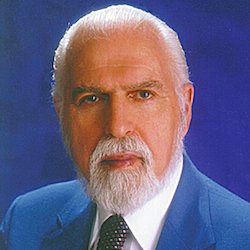
Today marks the third annual Rushdoony Commemoration Day, initiated here at Faith and Heritage back in 2016. In 2016 we looked at Rushdoony’s biblical philosophy of history and last year we discussed his view of the United Nations as an anti-Christian religious organization. Today we are going to have a look at Rushdoony’s view of the doctrine on which I believe the church stands or falls, the doctrine of Scripture as special revelation.
Because God cannot lie and is the ultimate truth, Rushdoony argues, God can only speak infallibly.1 If Scripture then reveals itself as the words of God, it can only be infallible. Basic to and theologically underlying the idea of infallibility, he adds, is the absolute sovereignty of God.2 God’s ability to speak infallibly rests on His total and comprehensive knowledge of all things, and this stands in contradistinction to humans, who, by means of their limited knowledge, can only speak fallibly.3
He further notes how the religious influence of rationalism is a very real threat to the flock of Christ:
The church too has gone over to the enemy. Very few seminaries hold now to the historicity of Genesis, chapters 1-11. Supposedly orthodox churches now treat candidates for the ministry who hold historicity of Genesis 1-11 with disrespect and suspicion. Having adopted another faith, they view with suspicion all who hold to the historical Faith.4
Rushdoony emphasizes that the characteristic of infallibility applies to all of God’s Word:
Jesus, in Matthew 5:17-20, affirms the absolute authority of every jot and tittle of the law of God. This is a very strong statement, and very important in affirming inerrancy. Not the slightest statement in the Mosaic Law can be overlooked. Its authority is total and its relevance is always limitless. We are not judges over God’s Word but are judged by it.5
Infallibility, he argues, is not only limited to the original autographs; rather, the infallible words of God are providentially preserved by God through the ages.
For Rushdoony, the core of the matter is an epistemological battle between rationalism and the Christian faith, i.e. the question concerning what is the ultimate source of authority.6 The sinful, corrupted nature of man forms the epistemological blockage against the reception of the truth of revelation:
Man as he is, fallen man, hears no voice but his own. When he reads the Bible, he hears it at best as his own voice; he rejects the independence of God because it is the antithesis of his own claim to independence. He cannot tolerate inerrancy nor Biblical law because both doctrines threaten his own belief in his independence. Fallen man hears his own voice in everything, and the voice of God in nothing independent of himself.7
Therefore the question at hand is to whose voice we are obedient – that of man (rationalism) or that of God (Christianity). Insight into the truth is granted man only by God’s grace through His Spirit, by which we believe and understand God’s Word.8
Commenting on the early chapters of Genesis, a favourite part of Scripture presented by liberal theologians as mythological, Rushdoony argues:
If we assert that we can set aside the six-day creation doctrine, we have asserted our supremacy over Scripture. Our mind and our convenience now have a higher authority than the Bible, so that we have denied its authority totally and asserted our authority instead. If we claim the right at any point to set aside Scripture, we have established ourselves as the higher authority at every point. Clearly, therefore, the question of authority is at stake in Genesis.
For Rushdoony, central to understanding biblical infallibility is the role of biblical law. Scripture presupposes that man’s fundamental problem is not his ignorance, but his moral character. Therefore when the infallibility of the Law given by Moses, as the means by which God establishes His Kingdom, is denied, the core message of Scripture is denied.9
For Rushdoony, taking a side in the epistemic battle between Christianity and anti-Christianity, one that marks all of human history from the earliest times, is at stake when it comes to the doctrine of Scripture. The flourishing of human civilization is greatly dependent upon the choice we make in this battle. The matter of scriptural authority is one of life and death, not only for human civilizations, but also for eternity, as Christ is nowhere revealed to us apart from the Bible itself.
Footnotes
| Tweet |
|
|
|




